Dental Implants Boston
Rebuilding Your Beautiful Smile

Your smile impacts every aspect of your life. If you have lost teeth to decay, gum disease, or an injury, replacing them as quickly as possible will help you avoid the health complications and the emotional distress associated with missing teeth. Thankfully, when it comes to rebuilding your smile, there’s no better option than dental implants!
Dental implants are a natural-looking, permanent replacement solution that can beautifully strengthen your smile and let you regain your active lifestyle. At Kraft & Schrott Dental Associates, we offer several dental implant options to help patients permanently replace missing teeth and create stronger, healthier smiles. Give us a call today to schedule your consultation!
Why Choose Kraft & Schrott Dental Associates for Dental Implants?
- Dr. Schrott: Prosthodontist with Years of Experience in Implant Dentistry
- Replace Any Number of Missing Teeth Permanently
- Flexible Financing Options to Help Make Dental Implants Affordable
What Are Dental Implants?
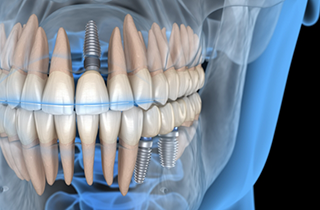
A dental implant is a small post made out of titanium, a highly durable and biocompatible metal. It is surgically placed into the jawbone where a missing tooth’s roots used to be. Afterward, it will fuse with the surrounding bone tissue over the course of three to six months. While the mouth is healing, the implant is slowly but surely anchoring itself into place to essentially become part of your mouth.
Once the integration process is complete, you’ll have a strong, comfortable, and reliable foundation for your new tooth! But first, you’ll return to our office so that we can attach a titanium abutment to the implant post. The abutment allows us to securely attach a custom restoration to the implant, resulting in a smile that looks and feels as natural as possible. This crown, bridge, or denture will be shaded and shaped so that it is virtually indistinguishable from the rest of your pearly whites. Rebuilding your teeth from the roots up gives you a smile that looks, feels, and functions just like natural once again.
Benefits of Dental Implants

Dental implants offer several benefits for eligible candidates. Some of the most significant advantages associated with this tooth replacement include:
- A comprehensive replacement: Because dental implants take the place of both the missing tooth and its supportive root, you won’t find a more stable or longer-lasting option.
- High success rate: Dental implants have a success rate of more than 95 percent.
- Increased comfort: Compared to other options for tooth replacement, dental implants offer more comfort and make it easier to speak clearly.
- Promote a balanced, nutritious diet: Stable dental implants allow you to eat all of your favorite foods, including health-promoting items that keep you looking and feeling great.
- Long-lasting: When cared for properly, dental implants can be expected to last a lifetime.
- A boost in confidence: Thanks to your improved appearance and chewing ability, you’re likely to feel much more confident after receiving your dental implant.
- Preserve your jawbone: Implants stimulate the jawbone to prevent it from breaking down.
Who Dental Implants Can Help

Once you and one of our implant dentists have determined that you are a qualified candidate for dental implants—and that these are indeed the best tooth replacement option for you—then your unique needs will dictate which type of implant procedure is best.
Missing 1 Tooth
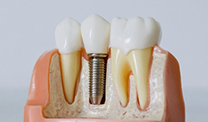
If you are missing one tooth due to decay, gum disease, or injury, we can replace that tooth with a single dental implant. Over a period of a few weeks, this implant and the surrounding bone tissue will fuse to form a solid foundation for your new porcelain crown, which will be placed by one of our highly skilled restorative dentists.
Missing Multiple Teeth
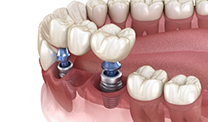
If you are missing more than one tooth, whether those teeth are consecutive or not, your complete and healthy smile can be restored with several dental implants. Our team will be able to determine the number of implants you need to firmly support your tooth restorations, which could be a bridge or a partial denture. These will be custom-designed in a dental laboratory to fit perfectly alongside your remaining teeth.
Missing All Teeth
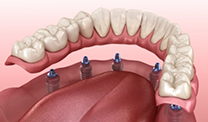
For our patients who already wear full dentures, as well as those who have recently lost all of their teeth along one or both arches, we offer implant dentures. Traditional dentures rest on top of the gums and are held in place by suction, the muscles of the cheeks and tongue, and when necessary, denture adhesive. Implant dentures are secured to dental implants by snapping onto implant attachments, which hold the dentures firmly on your implants.
For patients who have been missing all of their teeth for some time and have suffered bone loss as a result, All-on-4 can usually support a complete denture without necessitating bone graft surgery. For this unique procedure, we will place four implants along your arch of missing teeth in strategic locations to provide maximum support. Once the implants are in place, we can immediately attach your new custom-made denture, which you’ll wear day and night.
Learn More About Implant Dentures
Understanding the Cost of Dental Implants
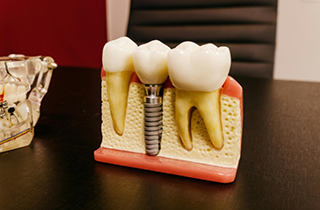
Dental implants cost more than other options for tooth replacement, but they are certainly worth the investment. In fact, over time, they may end up costing you less than a traditional denture or crown and bridge, as these non-implant-supported options will need to be replaced periodically as the bone structure weakens and wears away.
There is no single sticker price for dental implants, so the total price you pay will depend on certain factors — like how many teeth you are missing, where in the jaw they are located, how healthy your jawbone is, and more. To understand the cost of your tooth replacement, we invite you to schedule a consultation with your dentist in Boston today. No matter the price, the multiple benefits of dental implants make them well worth it!
Bone Grafts for Dental Implants
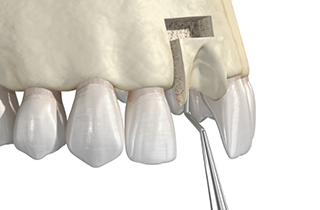
Prior to receiving dental implants, patients undergo extensive evaluation to determine whether they are healthy enough to be a successful recipient. For many years, lack of jawbone was one of the main reasons patients were considered less likely candidates, but not anymore! Our highly trained dentists can use advanced procedures like bone grafts to open new doors for patients who are unable to replace missing teeth with dental implants due to diminished bone volume.
How Bone Grafts Assist in the Implant Process
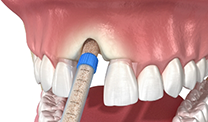
Osseointegration is what makes dental implants so successful. The implants are made of biocompatible materials that fuse to the jawbone, creating a support structure for dental restorations that mimic natural root structure. For this process to be successful, patients need adequate existing jawbone volume to support the implant. For patients who have diminished bone volume following tooth loss or mechanical trauma, a bone graft offers the opportunity to create the bone structure they lack.
Types of Bone Grafts
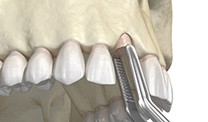
A bone graft is a surgical procedure during which an implant dentist either relocates existing bone tissue from another part of the jaw, bone from a tissue bank, or synthetic bone to build up the jaw to adequate strength to support one or more dental implants. There are many different types of bone grafts, but the three most common are:
- Ridge Augmentation - Following tooth loss, trauma, severe gum disease, or other oral health issues, the jawbone breaks down and may not allow for the placement of a dental implant. Ridge augmentation is the process of restoring or replacing this lost supportive bone so dental implants can be placed at a later time.
- Sinus Lift – Dental implants in the upper jaw sometimes cannot be placed due to an overly large maxillary sinus cavity. In these cases, a sinus lift procedure builds up the bone underneath the sinus in order to support an implant.
- Tooth Extraction & Ridge Preservation – Ridge preservation is a minimally invasive procedure whereby the dentist applies a protective membrane and bone grafting materials to the empty socket following tooth extraction ensuring the preservation of the jawbone.
Dental Implant FAQs
How Long Do Dental Implants Last?
Dental implants can last for over 30 years, which is far longer than the average lifespan for traditional dentures and bridges. Good oral health and regular maintenance are required if you want your implants to last as long as possible, so make sure that you brush and floss. You should also keep up with your dental cleanings to prevent small problems from turning into issues that can lead to dental implant failure.
Does Getting Dental Implants Hurt?
Placing implants involves very little discomfort during the surgery because you will be numb. You will experience some soreness for a few days afterward, which usually can be managed with over-the-counter pain medications such as Tylenol or Advil. The discomfort should lessen significantly after two or three days.
Are Dental Implants Safe?
When provided by an experienced and well-trained clinician, and as long as you are in good health, it is safe to get dental implants. Certain conditions such as gum disease that can put you at risk for implant complications or failure will need to be treated beforehand.
Smoking or uncontrolled diabetes can affect your body’s ability to heal after surgery, which can lead to treatment complications or failure.
How Long Does It Take to Recover from Dental Implant Surgery?
As with most procedures, the exact length of recovery time depends on your body’s natural healing abilities as well as the extent of the surgery. You should be able to return to work the same day or – in the case of larger procedures – three days after surgery. You should avoid any strenuous exercise that might disrupt the healing process and follow a soft food diet for up to six weeks.
Bleeding usually stops after the first few days, and swelling peaks at around three to five days. If any of these symptoms seem to persist longer than normal, call our office to let us know. Also, keep in mind that while the initial healing process is relatively short, it typically takes up to six months for the implant posts to fuse with the jawbone.
I Need a Checkup & Cleaning I Am Looking for a Dentist for My Child I am Worried About Gum Disease I Have a Cavity or Broken Tooth I am Missing One or More Teeth I Want to Enhance My Smile I am Scared of the Dentist I Have Jaw Pain I am Worried About Sleep Apnea I Have a Dental Emergency View Our Services






